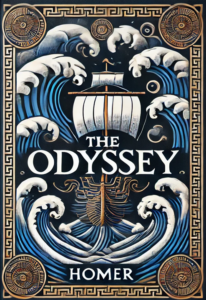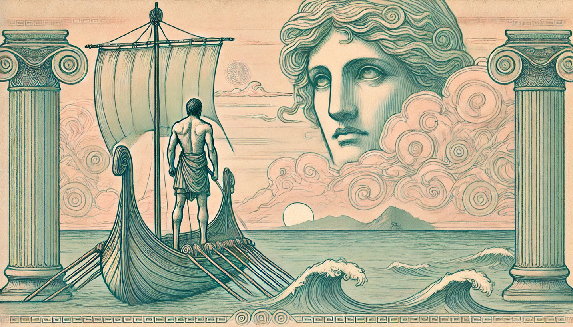SUMMARY
- The Odyssey chronicles Odysseus’s adventures as he attempts to return home after the Trojan War, facing numerous challenges and divine interventions.
- The narrative begins with Odysseus trapped on the island of Ogygia, while his wife, Penelope, and son, Telemachus, deal with the suitors in Ithaca.
- The themes of heroism, fate, and the influence of the divine are central, highlighting the tension between free will and destiny.
- Odysseus’s journey symbolises personal growth and identity, emphasising the importance of loyalty and family bonds.
- The poem’s rich storytelling and exploration of timeless themes contribute to its lasting impact on literature and culture.
REVIEW
The Odyssey, attributed to the ancient Greek poet Homer, is a cornerstone of Western literature. Composed in the late 8th century BC, this epic poem tells the story of Odysseus’s arduous journey home after the Trojan War. His voyage is marked by numerous challenges, divine interventions, and a longing to reunite with his family, making it a timeless tale of adventure and resilience.
The story begins with Odysseus trapped on the island of Ogygia, held captive by the goddess Calypso. Meanwhile, in Ithaca, Penelope, his wife, and their son, Telemachus, face their struggles as the suitors vie for Penelope’s hand. The gods, particularly Athena, are interested in Odysseus’s plight, setting the stage for his eventual release and journey home. As Odysseus encounters mythical creatures and navigates treacherous waters, his cunning and determination are tested repeatedly. The narrative’s impact lies in exploring human perseverance and the enduring power of hope, themes that resonate across cultures and eras.
The Odyssey delves into concepts such as heroism, fate, and the influence of the divine. Odysseus embodies the archetypal hero, using his wit and bravery to overcome obstacles. His journey is not just physical, but also a metaphorical exploration of identity and personal growth. The poem also examines the role of fate and the gods in human affairs, highlighting the tension between free will and destiny.
Another significant theme is the importance of home and family. Odysseus’s longing to return to Ithaca underscores the value of loyalty and love. Telemachus’s challenges in his father’s absence further emphasise the bonds of family and the quest for belonging. These universal themes contribute to the poem’s enduring relevance and appeal.
What makes the Odyssey special is its rich tapestry of adventure, mythology, and human emotion. Homer’s masterful storytelling and the poem’s exploration of timeless themes have captivated audiences for centuries. Its influence on literature and culture is profound, offering insights into the human condition and the complexities of life. The Odyssey is a testament to the power of storytelling and the enduring quest for home and identity.
CHARACTERS
Odysseus: The clever hero of the story, he struggles to return home to Ithaca after the Trojan War, facing numerous challenges along the way.
Penelope: The faithful wife of Odysseus, she waits for his return while fending off the suitors who seek her hand in marriage.
Telemachus: The son of Odysseus and Penelope, Telemachus embarks on a journey to find his father and assert his place in the world.
Athena: The goddess of wisdom who supports Odysseus and Telemachus, guiding them through their respective journeys.
Calypso: The nymph who captures Odysseus on her island, Ogygia, falls in love with him, delaying his return home.
Poseidon: The god of the sea, who opposes Odysseus, causing many of the obstacles he faces on his journey home.
Telemachus’s Suitors: A group of men who invade Odysseus’s home, vying for Penelope’s hand and consuming his wealth in his absence.
Eumaeus: The loyal swineherd who aids Odysseus upon his return to Ithaca, representing loyalty and friendship.
Eurycleia: The aged nurse of Odysseus and Telemachus, she recognises Odysseus when he returns and remains loyal to the family.
Antinous: The most arrogant of the suitors, he leads the group in disrespecting Penelope and plotting against Telemachus.
Agamemnon: A former king and hero of the Trojan War, he serves as a cautionary figure for Odysseus regarding the dangers of homecoming.
Achilles: Another hero of the Trojan War, he appears in the underworld and discusses themes of glory and mortality with Odysseus.
LOCATIONS
Ithaca: The home of Odysseus, where he longs to return to his wife Penelope and son Telemachus. Modern location: Ithaca, Greece.
Troy: The city where the Trojan War occurred, marking the beginning of Odysseus’s long journey home. Modern location: Hisarlik, Turkey.
Ogygia: The island where Odysseus is held captive by the nymph Calypso for several years. Modern location: Possibly near the island of Gozo, Malta.
Scheria: The land of the Phaeacians, where Odysseus is finally given help to return home. Modern location: Likely identified with Corfu, Greece.
Aeolia: The island of the wind god Aeolus, who provides Odysseus with a bag of winds to aid his journey. Modern location: Possibly near the island of Lipari, Italy.
Laestrygonia: The land of the giant cannibals who attack Odysseus and his crew. Modern location: Possibly near the Gulf of Taranto, Italy.
Circe’s Island (Aiaia): The home of the sorceress, Circe, who turns Odysseus’s men into animals. Modern location: Possibly identified with the island of Montecristo, Italy.
The Underworld: The realm of the dead, where Odysseus seeks guidance from the prophet Tiresias.
Ithaca (again): After many trials, Odysseus returns to his homeland, reclaiming his place and family.Modern location: Ithaca, Greece.
Penelope’s Hall: The setting of the final confrontation with the suitors, showcasing Odysseus’s cleverness and strength. Modern location: Ithaca, Greece.
- Creativity and Imagination: Reading Homer can inspire new ideas and enhance creative thinking.
- Empathy: Engaging with the characters and their experiences fosters a deeper understanding of others’ emotions.
- Cultural Awareness: Homer’s works provide insights into ancient cultures, enriching readers’ perspectives on history and society.
- Analytical Thinking: The complexity of the narratives encourages critical analysis and interpretation of themes and characters.
- Emotional Intelligence: Exploring characters’ emotional journeys helps readers develop emotional awareness and regulation.


